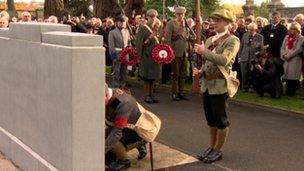Sinn Féin lord mayor at Belfast Armistice Day ceremony
- Published
Mr Ó Muilleoir joined the president of the Royal British Legion and Belfast City Council's chief executive for the two-minute silence
A Sinn Féin lord mayor has attended an Armistice Day ceremony for the first time in the party's history.
Máirtin Ó Muilleoir took part in an event in Belfast commemorating the end of World War One.
He said he had taken the decision as he wanted to show "respect to the unionist tradition".
Meanwhile, in Dublin men and women were on parade dressed in the historical uniforms of the Ulster Volunteer Force at the time of the Home Rule crisis.
The event at Glasnevin cemetery was aimed at promoting and explaining unionist culture and history among people in the Republic of Ireland.
In Belfast, the anniversary of the World War One armistice - signed 95 years ago - was marked at the city hall with a two-minute silence at 11:00 GMT.
In recent years, Sinn Féin's representatives paid their respects before remembrance ceremonies but did not attend the actual events.
'Showing respect'
The new move followed discussions between the Sinn Féin lord mayor and the Royal British Legion, the Belfast Telegraph reported.
"When I was appointed I said I would be the mayor for all the city," Mr Ó Muilleoir told BBC Radio Ulster's Talkback programme.
"Today, for me, was showing respect to the unionist tradition. I know that remembrance - Armistice Day in particular - in the unionist tradition is a crucial part of their heritage in this city," he added.
"I wanted to find a way, to use the words of my chaplain, which was imaginative and generous, in that I could take part in a remembrance ceremony.
"And I think we did that - the 11th hour of the 11th day of the 11th month, that I was able to stand at the Royal British Legion ceremony at city hall."
Mr Ó Muilleoir attended the ceremony shortly after returning from a visit to Canada.
His senior party colleague, Deputy First Minister Martin McGuinness, described the Belfast mayor's attendance at the British Legion ceremony as "admirable leadership".
'More inclusive'
Mr McGuinness wrote "respect, reaching out essential" on his Twitter account.
"I'm not the first, of course, mayor from my tradition to acknowledge the terrible loss and slaughter of the First World War," Mr Ó Muilleoir told Talkback.
"Alex Maskey laid a wreath on the Somme anniversary during his tenure. Tom Hartley spoke often about trying to make Remembrance Day and remembrance more inclusive, because many people in this city feel that remembrance isn't part of their tradition because they are nationalist."
More than 1,000 people gathered in the garden of remembrance at the city hall on Monday.
President of the Royal British Legion, Mervyn Elder, met the lord mayor and walked with him to the cenotaph. They paused briefly before observing the two-minute silence.
This year, Armistice Day, which honours members of the armed forces who have died in war, comes a day after Remembrance Sunday.
On Sunday, two-minute silences took place at war memorials across the UK and the Commonwealth.

People in UVF costumes laid wreathes at the war graves commission memorial in Dublin
Monday's silence took place at the 11th hour of the 11th day of the 11th month - the time the guns fell silent along the Western Front in 1918, and an armistice was declared.
Ulster Unionist leader Mike Nesbitt welcomed Mr Ó Muilleoir's attendance at the event and that of SDLP leader Alasdair McDonnell at a service in Parliament Buildings.
"I consider these gestures important at a time when a generosity of spirit will be required from all political leaders, if we are to succeed in our current efforts to reach agreement on the difficult issues under consideration in the Haass talks process," Mr Nesbitt said.
UVF exhibition
In Dublin, the largest collection of UVF memorabilia gathered together in one place was on display.
The fact that it was at the burial ground for some of Ireland's best-known republicans showed the unique nature of the occasion.
The Ulster Volunteer Force was formed to resist plans to make Ireland self-governing, but many members went on to fight in the First World War.
The exhibition is called Home Rule Crisis... the unionist response and covers the period from 1912-1914. It was officially opened by the Irish Minister for Arts and Heritage Jimmy Deenihan.
As well as those involved in historical re-enactments of the UVF, a number of unionist politicians were also at the north Dublin event.
A priest read prayers before people in UVF costumes laid wreaths at the war graves commission memorial to those from the Republic who died fighting for the allies in the two world wars.
- Published10 November 2013
- Published5 November 2013
- Published10 November 2013
- Published10 November 2013
- Published10 November 2013
- Published9 November 2013
- Published20 September 2013